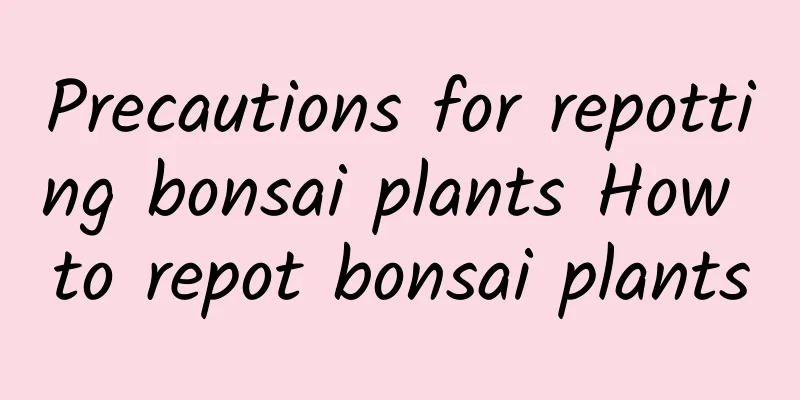Precautions for repotting bonsai plants How to repot bonsai plants

|
When growing flowers at home, you often need to change the pots of the flowers. The purpose of changing the pots is to give the flowers a better growing space, allowing them to grow better and bloom more. So what are the precautions when changing the pots of potted plants? Things to note when repotting potted plants1. How many times should you change the pot? When repotting, please note that the more times you repot, the better. Twice a year is the maximum . Repotting more often will hinder the normal growth of the potted plants and may even cause them to wither and die. If the growth is slow, repotting once every three years is enough . 2. Environment after repotting After the pot is changed, the potted plants need to be placed in a cool and ventilated place . After about a week of adaptation, they can be moved to a sunny and well-ventilated place for maintenance. And it should be noted that it is best not to fertilize the plants within three months after the pot is changed . Time to repot potted plantsGenerally, after 1-3 years of potted plants growing , the nutrients in the pots will be consumed, and as the plants grow, the original pots are too small and not conducive to the expansion of the root system, so it is necessary to repot . However, repotting has high requirements for temperature, so try to choose spring and autumn when the climate is mild and suitable for the subsequent growth of potted plants. Key points for potting repotting1. Root pruning and drying When repotting potted plants , old roots, diseased roots, rotten roots and weak roots should be trimmed . After pruning, soak the roots in diluted carbendazim or potassium permanganate solution for disinfection and sterilization, and then dry them in the sun for 2-3 days before planting. 2. Watering Most potted plants cannot be watered immediately after being repotted . They must be placed in diffuse light for about 7-15 days. Wait until the soil is completely dry before watering . Water slowly and in small amounts to prevent water accumulation in the soil and root rot. 3. Soil for repotting Generally , potted plants prefer loose, breathable, well-drained and fertile soil . You can buy ready-made soil suitable for potted plant growth on the market, or you can prepare it yourself according to the needs of potted plant growth and then use it after exposing it to the sun for sterilization. |
>>: What is the name of the herbicide that can kill all grass in three years?
Recommend
Can firecracker flowers be grown at home?
Is it poisonous? Whether a plant is poisonous or ...
When do begonias bloom?
Flowering time The common begonia blooms in July,...
Do kiwi trees prefer shade or sun?
Do kiwi trees prefer shade or sun? Kiwi trees are...
How to grow Clivia best
1. Watering Clivia has relatively developed flesh...
How to care and cultivate Clerodendrum thomsoniae
Growing conditions of Clerodendrum thomsoniae The...
Common pests of delphinium and their control methods
Common pests of delphinium: aphids Characteristic...
How to save shallot seeds
Shallot seeds introduction Shallots are also call...
When does Spathiphyllum bloom?
1. Which month does it bloom? Not only do the Spa...
There are several types of blood vine, pictures of chicken blood vine
1. There are several Generally speaking, vines th...
How to grow schefflera
Temperature management of Schefflera cultivation ...
How to grow grass with a grass doll (what does a grass doll look like, pictures of the growth process)
Some time ago, I suddenly wanted to put some diff...
Does spider plant absorb formaldehyde? The number one plant for removing formaldehyde
1. Do spider plants absorb formaldehyde? Chloroph...
How to plant Amaryllis bulbs
1. Planting time To ensure a good survival rate, ...
When grandma fell in love with growing flowers, she planted 10,000 pots of flowers on the rooftop. It’s crazy!
Grandpa and grandma are addicted to growing flowe...
Lemon Growth Environmental Conditions and Characteristics
Lemon growing environment conditions and requirem...









